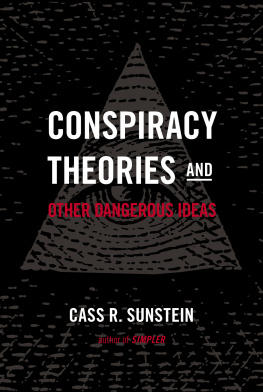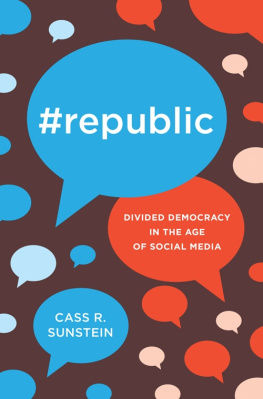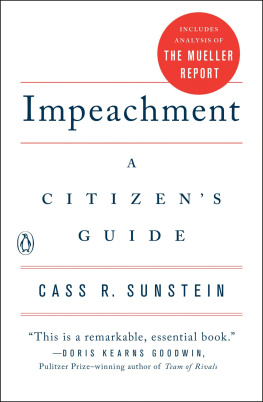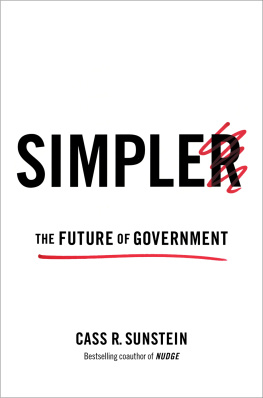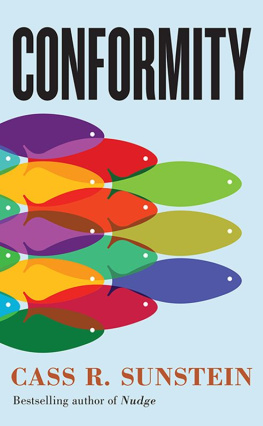This Is Not Normal
This Is Not Normal
The Politics of Everyday Expectations
Cass R. Sunstein

Copyright 2021 by Cass R. Sunstein.
All rights reserved.
This book may not be reproduced, in whole or in part, including illustrations, in any form (beyond that copying permitted by Sections 107 and 108 of the U.S. Copyright Law and except by reviewers for the public press), without written permission from the publishers.
Yale University Press books may be purchased in quantity for educational, business, or promotional use. For information, please e-mail (U.K. office).
Set in Janson type by Integrated Publishing Solutions.
Library of Congress Control Number: 2020936929
ISBN 978-0-300-25350-4 (hardcover : alk. paper)
A catalogue record for this book is available from the British Library.
This paper meets the requirements of ANSI/NISO Z39.48-1992 (Permanence of Paper).
For Ellyn, Declan, and Rian, forever young
Contents
ONE
Howling with the Wolves
TWO
The New Normal
THREE
Revolution Is in the Air
FOUR
Lapidation and Apology
FIVE
Founding
SIX
Refounding
SEVEN
Radicals
EIGHT
Liberalism
NINE
Who Will Stop Me?The Cult of Ayn Rand
TEN
Historys Forks
Preface
If your government jails people because of their political convictions, you might not think that it is so terrible if public officials read your email. If you live in a society in which officials routinely steal public money for their own use, you might not mind so much if an official asks for a little bribe in exchange for letting you open a small business. If sexual harassment is rampant in your society, you might not object much if male employers flirt with female employees. In a nation that suffers from pervasive poverty, the idea of a right to health care might not get much traction. What provokes our outrage depends on what surrounds uson what we consider normal.
Not so long ago, it was normal for public schools in the United States to require students to pray every morning. (As a young boy in public school in Massachusetts, I said the Lords Prayer in school, Monday through Friday.) Not so long ago, it was normal for people to drive without seatbelts and to smoke in public buildings. Not so long ago, bans on same-sex marriage were part of lifes furniture. Not so long ago, many people took democratic self-government so much for granted that it was not seen as needing justification. At the same time, they had a concrete understanding of what democratic self-government entailed, such that departures from that understanding were not normal. They were essentially unthinkable.
In 2020, the coronavirus pandemic radically changed peoples conception of what is normal. A ban on flying to Italy? At one point, that would have been unimaginable. Offices and shops closed, and schools and universities using online classes? At one point, people could not have tolerated those ideas. Staying at home, except for specified activities, such as getting food? That might have seemed the stuff of a nightmare, or perhaps authoritarianism. But in short order, all these became normal. Some people rebelled, but many people seemed to think: Okay, I understand. As radical social changes were normalized, the number of people who were willing to agree to them, or even to embrace them, steadily grew.
What is normal might be either wonderful or horrible. The cry This is not normal! therefore needs to be supplemented by some argument if it is to be taken as synonymous with This is terrible! Some people try hard to expand the boundaries of the normal; others try to contract those boundaries. Without knowing what they are doing, we cannot know how to evaluate their actions. Freedom fighters try, simultaneously, to expand and contract the boundaries of what is normal. They seek to open some spaces and close others. Fascists and authoritarians of all stripes work to expand peoples sense of what is normalsometimes in stages, sometimes quite abruptly (consider the Holocaust). They also seek to contract that sensesuggesting, for example, that expressions of dissent and disagreement, once respected, are abhorrent, a kind of disloyalty, perhaps something to be forbidden. With the #MeToo movement and the attack on sexual violence and harassment, feminists have contracted the understanding of what is normal but also expanded itfor example, by suggesting that it is perfectly normal, or should be, to call harassers and rapists to account.
In this book, I shall explore the power of the normal from a variety of angles. Responses to a pandemic provide especially vivid examples, but I shall focus more generally on the relationship of the normal to the trials and tribulations of democracyits creation, its improvement, its reformation, its deterioration, its collapse. As we will see, those who seek to promote democratic goals work hard to alter the sense of what is normal. They often suggest that if certain groups are denied a right to participate in politics or to say what they like, something has gone terribly wrong. We can see them as trying to enlarge peoples understanding of the normal. They might alter the very meaning of the right to participate in politicsfor example, by calling for automatic voter registration, for lowering the voting age, and for allowing convicted felons to vote. Movements for self-government, old and new, proceed in this way.
Those who seek to undermine democratic goals do something similar. They might suggest that certain restrictions on the right to vote, or on freedom of the press, are perfectly normalthe kind of thing that leaders simply do. Movements toward authoritarianism, old and new, proceed in this way. They might start slowly and move incrementallyan approach that, as we will see, can make good psychological sense. They might accelerate rapidly. As we will also see, that approach too can work if they have force on their side and can also move public opinion. Authoritarians might take advantage of any available opportunities, as happened in 2020, in both Hungary and Thailand, in connection with the coronavirus pandemic. When people are frightened, and need to take strong steps to protect public health, they might be diverted or open to any number of restrictions on their freedom.
These points cast a skeptical light on Winston Churchills famous claim that democracy is the worst form of government, except for all those other forms that have been tried from time to time. Churchill was clever, but his claim smacks of elitism. It seems to be a kind of sneer. Actually, it is a terrible thing to say. Democracy is not the least bad form of government; it is the best. This is so for two reasons. First, democracy is rooted in a commitment to the equal dignity of human beings. Because of that commitment, it is equally committed to peoples right to govern themselves. Democrats insist that each of us is entitled to a voice in determining our nations course. Democracy rests on a belief that sovereignty lies in the people, not a dictator, a monarch, a party, or a king. That belief depends in turn on a judgment that no person, and no group of people, should be subordinated to another.
Abraham Lincoln put it this way in 1854: If the negro is a man, is it not to that extent, a total destruction of self-government, to say that he too shall not govern himself? When the white man governs himself that is self-government; but when he governs himself, and also governs another man, that is more than self-governmentthat is despotism.... No man is good enough to govern another man, without that others consent. I say this is the leading principlethe sheet anchor of American republicanism.
Next page

